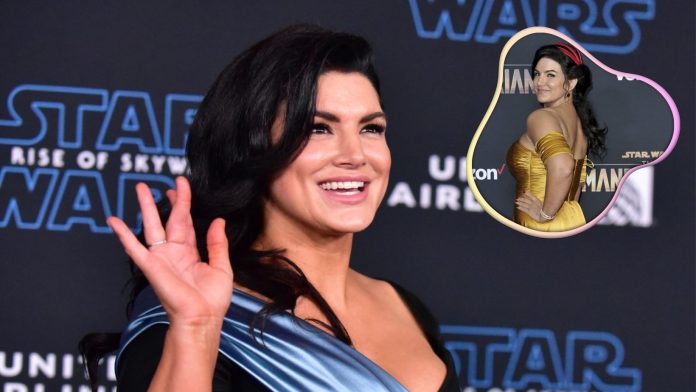- Despite reports suggesting otherwise, Carano has denied wanting to return to Disney amid her legal battle.
- Carano has filed a lawsuit against Disney, alleging discrimination and wrongful termination.
- Carano has criticized the media for misrepresenting her stance on rejoining the Star Wars franchise.
- The outcome of Carano’s lawsuit could have significant implications for employment law and freedom of speech in the entertainment industry.
Newsypeople- Gina Carano is an American actress, television personality, and former mixed martial artist. Born on April 16, 1982 in Dallas, Texas, Carano is the daughter of former Dallas Cowboys quarterback Glenn Carano.
Carano began her career in the sport of Muay Thai, where she compiled a record of 12-1-1 before transitioning to professional MMA. In MMA, Carano competed in promotions like Strikeforce and EliteXC, amassing a 7-1 record and earning the moniker “the Face of Women’s MMA”.

Outside of fighting, Carano served as a mentor on the reality TV series “Fight Girls” and appeared as ‘Crush’ on the revived “American Gladiators” series. Her breakout acting role came in 2011 when she starred in the film “Haywire” directed by Steven Soderbergh, earning a Critics’ Choice Award nomination.
Carano went on to appear in other action films like “Fast & Furious 6” and “Deadpool”. She also secured a lead role in the Disney+ Star Wars series “The Mandalorian” as Cara Dune, but was later fired from the show after sharing controversial social media posts.
Also Read: Is Max Domi Related To Tie Domi? Relationship And Family
Gina Carano Denies Wanting Disney Reunion Amid Legal Battle
Gina Carano, the former star of “The Mandalorian” on Disney+, has denied reports that she is eager for Disney to reinstate her to her old job amidst a legal battle. This denial comes as Disney has filed a motion to dismiss Carano’s lawsuit, which alleges that the company unlawfully retaliated against her for expressing her political views. Carano was fired from the show in February 2021 after making a controversial comparison between the treatment of modern-day conservatives and the persecution of Jews in Nazi Germany.
Disney’s motion to dismiss argues that the company has a First Amendment right to fire Carano and that it has a “constitutional right not to associate its artistic expression with Carano’s speech.”
Carano has responded to this motion by accusing Disney of attempting to control what she says and thinks, and of discriminating against her based on her political views. She has stated that Disney’s actions confirm what has been known all along: that the company will fire anyone who disagrees with them, even if it means misrepresenting, maligning, and mischaracterizing them to do so.
Carano’s lawsuit seeks to reinstate her to “The Mandalorian” and award her damages, arguing that her words were twisted to demonize and dehumanize her as an “alt right wing extremist.” She has also teamed up with conservative outlets for film appearances, indicating her continued career outside of Disney’s franchises.
The legal battle between Carano and Disney has drawn attention to the broader issues of free speech, discrimination, and the power dynamics within the entertainment industry. Carano’s denial of wanting a Disney reunion amidst the legal battle underscores her focus on the legal aspects of her dispute with the company, rather than on a potential return to her role on “The Mandalorian”.
Disney Reaction To Gina Carano’s Lawsuit Allegations Of Discrimination
Disney has responded to Gina Carano’s lawsuit by seeking to dismiss the case, arguing that her public comments, including a controversial Instagram post comparing the treatment of modern-day conservatives to the persecution of Jews in Nazi Germany, were the final straw leading to her termination from “The Mandalorian.”
Disney emphasized that Carano’s comments trivialized the Holocaust by referring to “thousands” of Jews instead of “millions” and by likening the experience of contemporary conservatives to that of Jewish people during the Holocaust. The company stated that it had no plans to hire Carano in the future and that her comments were “abhorrent and unacceptable”.

In its motion to dismiss, Disney invoked a broad exception for companies whose business is to engage in speech, such as newspapers and entertainment companies, to argue that it has the right to fire Carano for her political views. The company cited a law review article and a commentary written by UCLA law professor Eugene Volokh to support its argument.
Carano’s lawsuit alleges that Disney retaliated against her for expressing her political views, invoking a California law that prohibits employers from retaliating against employees for political activity. She is seeking reinstatement to “The Mandalorian” and damages for wrongful termination and discrimination.
Disney’s response underscores the gravity of Carano’s public comments and their impact on her employment, highlighting the ongoing debate surrounding her termination and the legal battle that ensued.
- Criticism of Disney: Some have criticized Disney for its handling of the situation, viewing Carano as a patriot who was unfairly backlisted by Hollywood. This perspective suggests that there is a perception of bias or unfair treatment against conservative voices in the entertainment industry.
- Disney’s Justification: Disney’s decision to dismiss the lawsuit is based on the argument that it has a constitutional right not to associate its artistic expression with Carano’s speech, citing the First Amendment as a complete defense to Carano’s claims. Disney compared its authority to that of a newspaper, which is entitled to broad deference in choosing which writers to employ to express editorial positions, and similarly, Disney claimed its creative production enterprise is entitled to decide which performers express its “artistic messages”.
The public’s response reflects a broader debate on free speech, discrimination, and the power dynamics within the entertainment industry. While some support Carano’s stance against what they perceive as unfair treatment, others criticize Disney for its decision, highlighting the complexities of the situation and the differing views on the matter.



